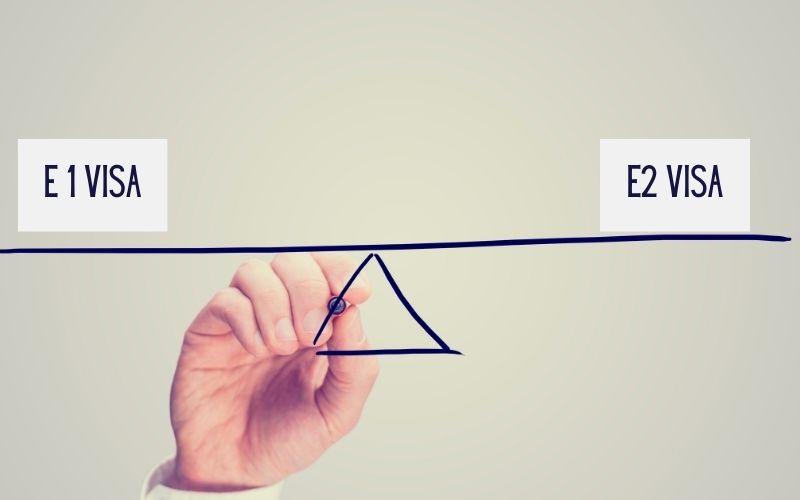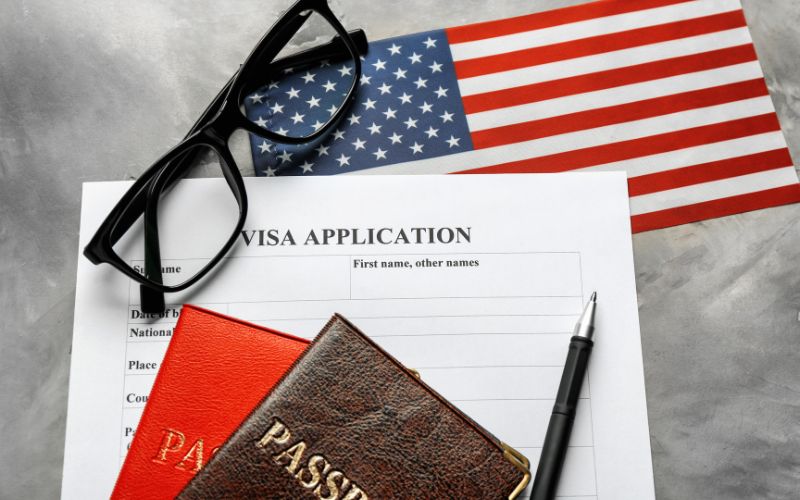E1 vs E2 Visa: Find Your Best Path
Expanding into the U.S. market as a foreign entrepreneur begins with selecting the right visa—often a choice between the E1 vs E2 visa. The E1 and E2 visas are both part of the U.S. treaty-based visa programs designed to promote trade and investment. However, each visa has a distinct purpose, process, and set of qualifications.
In this guide, we break down the key differences between the E1 vs E2 visa, explain who qualifies for each, and show why the E2 visa, especially when combined with franchise investment, is the preferred path for most foreign investors seeking a long-term presence in the United States.
Understanding the Purpose of E Visas
The E visa category was created to support economic cooperation between the U.S. and select treaty countries. While E1 and E2 are nonimmigrant visas, they are designed for different business activities.
Consular officers play a crucial role in the E2 visa application because they grant E2 visa validity periods that may differ from the maximums outlined in the reciprocity table. During the visa interview, applicants must engage with the consular officer about their business plans and address any questions, underlining the importance of the consular officer’s assessment in the visa decision-making process.
E1 Visa:
Intended for individuals or companies involved in international trade activities on their behalf, the E1 visa, also known as the Treaty Trader visa, aims to facilitate the movement of such individuals. Treaty traders, the people engaged in substantial trade between the United States and their country of citizenship, must meet specific eligibility requirements to qualify for the E1 visa.
E2 Visa:
Designed for individuals making a substantial investment in an investment enterprise in the U.S. that they will actively manage or invest in to generate above-marginal profits. The term “substantial amount” refers to treaty investors who invest large amounts of capital in U.S. businesses, demonstrating their commitment and bearing commercial risks.
Both visas allow the applicant’s spouse and unmarried children under 21 to accompany them to the U.S. Spouses may also apply for work authorization.
Key Differences Between the E1 and E2 Visas

Though both visas provide opportunities for treaty nationals to conduct business in the U.S., individuals and employees must be essential to the business’s operations to ensure a smooth application process. The E2 visa is for foreign nationals making significant investments in U.S. businesses. The core difference lies in trade versus investment.
E1 Visa (Treaty Trader)
- For citizens of treaty countries who are already engaged in substantial trade with the U.S.
- At least 50% of the trade must be between the U.S. and the treaty country
- Trade must involve numerous and ongoing transactions
- No capital investment is required
- The business must already exist before applying
- No requirement to hire U.S. workers
- Not intended for starting a new business
- Can be renewed indefinitely, provided the business continues to meet requirements
- Focuses on nationals from treaty countries who engage in international trade, known as ‘treaty business‘. Special qualifications and skills are vital for operating within this treaty business, as evaluated by USCIS during the visa application process.
E2 Visa (Treaty Investor)
- For citizens of treaty countries who wish to invest in a new or existing business in the U.S.
- Must own at least 50% of the business or have significant operational control
- Requires a substantial investment, generally starting at around $100,000 or more, depending on the industry
- The business must not be marginal; it must generate enough income to support the investor and their family and contribute to the U.S. economy
- Applicant must be actively involved in the business
- Franchises are often a suitable investment choice
- Can also be renewed indefinitely, as long as the business remains viable
- E2 visa holders need to actively manage their business and provide proof of growth during the visa period to qualify for extensions
Eligibility Requirements – Compared
| Requirement | E1 Visa (Treaty Trader) | E2 Visa (Treaty Investor) |
|---|---|---|
| Treaty Country Citizenship | Required | Required |
| Type of Activity | Trade of goods/services | Investment in U.S. business |
| Capital Investment | Not required | Required (must be substantial) |
| Ownership | Not required | At least 50% ownership or managerial role |
| Trade or Business Status | Must already be trading | May start or buy an existing business |
| Risk of Funds | Not applicable | Funds must be “at risk” |
| Intent to Return Home | Required | Required |
| Family Eligibility | Spouse and children under 21 may join | Spouse and children under 21 may join |
| Work Authorization for Spouse | Allowed | Allowed |
| Supporting Documentation | Required to demonstrate eligibility and substantiate claims during consular interview | Required to demonstrate eligibility and substantiate claims during consular interview |
E1 vs E2 Visa: Treaty Countries
While countries such as Japan, Germany, the United Kingdom, and Australia qualify for both, many others qualify only for the E2 visa, making it the more accessible option for a broader range of investors.
To see if your country qualifies, refer to the most current list of treaty countries on the U.S. Department of State website.
E1 Visa (Trader)
Argentina, Australia, Austria, Belgium, Bosnia and Herzegovina, Brunei, Canada, Chile, China (Taiwan), Colombia, Costa Rica, Croatia, Denmark, Estonia, Ethiopia, Finland, France, Germany, Greece, Honduras, Ireland, Israel, Italy, Japan, Jordan, South Korea, Kosovo, Latvia, Liberia, Luxembourg, Macedonia, Mexico, Montenegro, Netherlands, New Zealand, Norway, Oman, Pakistan, Paraguay, Philippines, Poland, Serbia, Singapore, Slovenia, Spain, Suriname, Sweden, Switzerland, Thailand, Togo, Turkey, United Kingdom, Yugoslavia
E2 Visa (Investor)
Albania, Argentina, Australia, Armenia, Austria, Belgium, Bosnia and Herzegovina, Azerbaijan, Brunei, Bahrain, Canada, Bangladesh, Chile, China (Taiwan), Bolivia, Colombia, Costa Rica, Bulgaria, Croatia, Cameroon, Denmark, Estonia, Ethiopia, Finland, France, Congo (Brazzaville), Germany, Congo (Kinshasa), Greece, Honduras, Ireland, Czech Republic, Israel, Italy, Ecuador, Japan, Egypt, Jordan, Kosovo, Latvia, Liberia, Georgia, Luxembourg, Macedonia, Grenada, Mexico, Montenegro, Netherlands, New Zealand, Norway, Jamaica, Oman, Pakistan, Paraguay, Kazakhstan, Philippines, South Korea, Poland, Serbia, Kyrgyzstan, Singapore, Slovenia, Spain, Lithuania, Suriname, Sweden, Switzerland, Thailand, Moldova, Togo, Mongolia, Turkey, United Kingdom, Morocco, Yugoslavia
Application Process for E Visas

The application process for both E1 and E2 visas is similar in structure but differs in the required documentation. Immigration services play a crucial role in detailing the necessary documentation that must be filed with the United States Citizenship and Immigration Services (USCIS) when there are changes in the employment conditions of treaty traders.
General Steps:
- Complete Form DS-160 (nonimmigrant visa application)
- Submit Form DS-156E (for E visa applicants)
- Prepare a strong supporting document package, including:
E1: Trade documentation, contracts, invoices, shipping logs
E2: Business plan, proof of funds, purchase agreements, lease, etc.
- Attend a visa interview at the U.S. embassy or consulate in your country
Your interview will focus on the nature of your business or trade, qualifications, and plans in the United States. Applicants must also demonstrate nonimmigrant intent, meaning they plan to return to their home country after the visa expires.
Why the E2 Visa and Franchising Make a Great Fit for Foreign Investors
If you’re a foreigner thinking about building a future in the United States, the E2 visa can help significantly, but pairing it with the right business opportunity is just as important. The E2 visa is for individuals who seek admission to the United States solely for investment purposes.
That’s where franchising comes in.
Unlike starting a business from nothing, investing in a franchise gives you a head start. You’re buying into a brand with a proven system, support structure, and customer base. For E2 visa applicants, this can make a big difference—both in getting approved and in setting yourself up for long-term success.
Here’s why the E2 + franchising combination works so well:
- You’re not going it alone. Franchises offer training, marketing tools, and ongoing support from the franchisor. That’s invaluable if you’re new to doing business in the U.S.
- It’s easier to show the U.S. government your business is viable. With a franchise, you can provide clear financial data, a solid business plan, and realistic projections—things that E2 visa officers want to see.
- There are franchises in nearly every industry. Whether you’re passionate about food, wellness, education, home services, or senior care, chances are there’s a franchise that fits your interests and investment level.
- You keep control. As an E2 visa holder, you’ll be running the business yourself—franchising doesn’t take away your role as an owner or operator.
And here’s the real benefit:
The E2 visa is renewable as long as your business remains active and meets the requirements. That means you can stay in the U.S. for years to come, grow your business, and bring your family along with you. Your spouse can even apply for work authorization, and your kids can live and study in the U.S.
So if you’re looking for a smart, supported way to move to the United States and build something of your own, investing in a franchise under the E2 visa is one of the most practical and effective routes available.
And you don’t have to figure it out on your own—a U.S. franchise consultant for an E2 Visa, Adam Goldman, can help you find the right opportunity, guide you through the process, and connect you with the right legal and financial resources to make it happen.